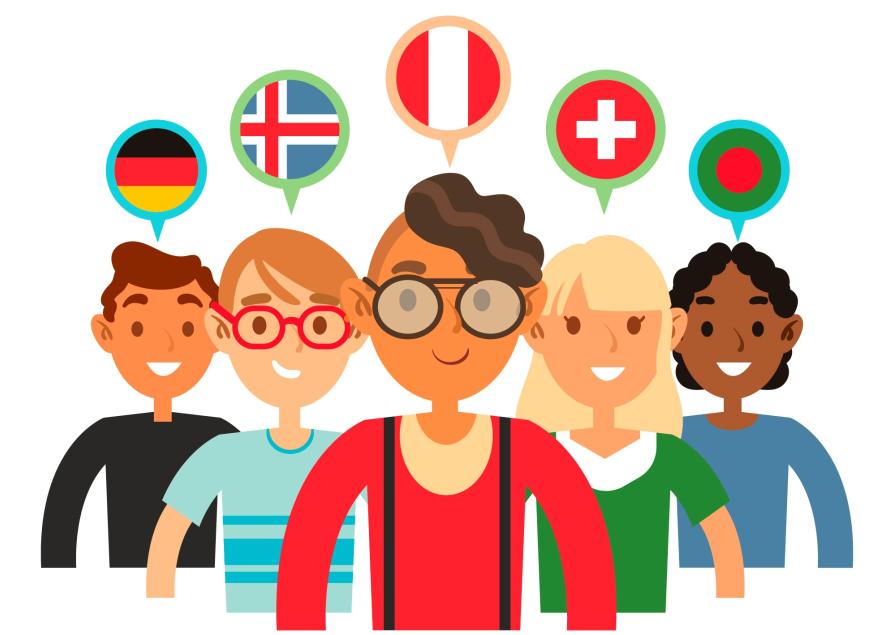Best universities focused on studying modern languages in Canada according to QS World University Rankings offer quality bachelor's and master's programs for foreigners.
Today's students will become the leaders of tomorrow's increasingly multicultural society. The study of modern languages helps to develop critical thinking in intercultural aspects, to hone oral and written communication skills.

TOP universities offer courses in American Sign Language (ASL), Arabic, French, German, Irish, Italian, Norwegian, Polish, Russian, Spanish, Swedish, Ukrainian languages + courses in comparative literature, Scandinavian studies, Slavic studies.

Possible career options:
- Translator
- Journalist
- Teacher
- Tourism Manager
- Foreign Service Officer
- Specialist in International Law
- Specialist in international relations.

Best modern languages universities in Canada 2026 - QS World University rankings
| 1 | University of Toronto |
| 2 | University of British Columbia |
| 3 | McGill University |
| 4 | University of Alberta |
| 5 | Queen's University at Kingston |
| 6 | University of Ottawa |
| 7 | Montreal University |
| 8 | York University |
| 9 | University of Calgary |
| 10 | Concordia University |
| 11 | Université du Québec |
1. University of Toronto
One of the best universities in Canada, occupies a leading position in the Times Higher Education and QS World University Rankings. About 85,000 students study here, including 26,000 foreigners from 160 countries. The University of Toronto offers more than 700 educational programs, the most popular of which are medicine, engineering, computer science, economics, linguistics, psychology. The university has more than 350 student clubs and organizations. Also the university supports volunteer activities. The University is known for its successful programs in the fields of arts, sciences and management. The certificate obtained here is recognized internationally by employers from around the world. So graduates should know that their diplomas will be appreciated in other countries.
The admission competition is 43% for both international and local students who choose bachelor's and master's degree programs. During the last enrollment, about 93,000 students were enrolled, of which about 72,000 are studying for a bachelor's degree, 20,000 for a master's degree.
At U of T, students have the opportunity to improve English skills by entering the English Language Program. This course is designed for students aged 17 and over, providing a variety of learning options, such as academic English and "English+".
2. University of British Columbia
UBC is the world's leading center for research and education, regularly ranked in the top 20 best public universities in the world.
The submission of documents to UBC is conducted three times a year: in summer, winter and autumn. The average passing score is about 3.6 out of 4.0, corresponding to 91%. To enroll in the UBC Master's program, you need to score a total of 65-76%. Also in order to make your application for admission more attractive, it is recommended to provide the results of the GMAT test at least 650 points or the GRE test at least 320 points.
The UBC campus in Vancouver is a dynamically developing community resembling its own small town, but at the same time allowing you to quickly get to the beaches, the city center and the mountains.
UBC offers students a wide range of programs for learning modern languages, providing various studying forms. You can choose language courses in 100 or more areas, including English, French, German, Chinese, Japanese, Korean, Spanish, Italian, Russian and others. Students have access to both general language courses and specialized programs for preparing for international exams: IELTS, TOEFL, DELF, DALF, Goethe Zertifikat and others. In addition, you can study rare languages at UBC, such as Arabic, Bengali, Hindi, Punjabi, Persian, Turkish and others.
3. McGill University
The university is named after James McGill, a Scottish merchant who made a donation in 1813 to establish the college which became the forerunner of the university. The official name changed to McGill University in 1821 after receiving a royal charter from King George IV. MGU became part of the Association of American Universities in 1926 and was one of the founders of Universitas 21, an international network of leading research universities.
The main campus is located in the center of Montreal, Quebec, Canada, and is divided into two parts: lower and upper. About 3,500 undergraduate students live here, restaurants, cafes, shops and medical facilities are nearby. Additionally, the campus is conveniently accessible by public transport. MGU is featured by moderate competition in admission: the student admission rate is 38%, about 29.2% of applications are accepted, and foreign students account for 24% of the total.
At MGU, you can study modern languages, including English and French. The university offers a variety of programs and courses, opportunities for practical use of the language and integration into the international student community.
4. University of Alberta
Located in Edmonton, Canada, it was founded on October 1, 1908. More than 38,000 students receive education here, making it one of the largest universities in the state. The University of Alberta offers more than 400 bachelor's degree courses and about 500 Master's degree courses, with 18 faculties.
It is one of the hundred world's leading universities, positioning in the top five in Canada. According to Times Higher Education rankings, the university positions the 118th line in the world and 6th in Canada. The enrollment competition is medium, with an admission rate for undergraduate programs accounting for 58%, but for graduate programs this figure is only 4.9% The best 5% of students in each course regularly are awarded a gold standard scholarship.
Here, students can study modern languages at the English Language School (ELS), offering various programs, including a basic English course, a semi-intensive course and preparation for TOEFL/IELTS exams.
5. Queen's University
The Queen’s Ontario University estate covers over 1,400 hectares (3,500 acres), including the castle at Hurstmans in East Sussex, England. The university consists of eight faculties and schools.
Queen's University was founded in October 1841, when Queen Victoria granted the Church of Scotland the right to establish a Royal College. Today, Queen's University, which accepts students of both genders without age restrictions, having more than 24,000 students. Graduates hold high positions in government structures, academia and business. Graduates hold high positions in government structures, academia and business. Queen's University has graduated 57 Rhodes Scholars, five Nobel laureates and one Turing Prize winner.
The study of modern languages at Queen's University Belfast is conducted at the own Language School. The school offers English language courses for teenagers aged 13-17. The studying is conducted in groups of up to 15 people, allowing teachers to pay enough attention to each student in the classroom. The program includes academic classes, on-campus activities and excursions. The cost depends on the chosen program and the course duration.
6. University of Ottawa
The university, which began its educational activity in 1848, is considered a non-profit state higher educational institution. Today, it offers more than 400 degree programs, including bachelor's and master's degrees in arts, humanities, social sciences, natural sciences, engineering, health and education. It is consistently ranked among the top ten in Canada, and is highly respected for its research and high quality teaching.
The admission rate is approximately 50%, making it one of Canada's most competitive institutions of higher education. The University consists of 10 faculties, including Art, Education, Engineering, Health Sciences, Law, Medicine, Natural Sciences, Social Sciences, Telfer School of Management and the Institute of Public Health.
The University offers the International Studies and Modern Languages (Fonts) program with an emphasis on the study of international issues, cross-border phenomena and intercultural relations. The program provides a deep knowledge of the complex interrelationships and interactions between local, national, regional and global processes. In addition, the course offers advanced preparation in foreign languages: students acquire skills in two official languages of Canada and at least one additional modern language, providing effective preparation for the requirements of an international career.
7. Montreal University
About 73% of students are enrolled in bachelor's degree programs, and 27% are educated in master's degree programs. Approximately 11,000 foreign students study at the campus annually, making it one of the most international universities in Canada. According to Times Higher Education, it is the third largest university in the country in terms of the share of foreign students.
Montreal University has a worldwide reputation in the fields of librarianship and information management, statistical and operational research, veterinary medicine, mathematics, computer science and information systems. A total of 600 programs are offered to choose from, and there are 13 faculties. MU's main campus is located on 65 hectares of land on the northern slope of Mount Royal, one of the most beautiful urban parks in the country. The campuses of MIL, Laval Campus, Saint-Hyacinthe Campus, Mauricie Campus and others are part of the university.
English and French language learning is provided here. Classes are held in the morning, the program is tailored to the age characteristics of students and modern topics for discussions and projects. The course duration starts from one week, the study levels range from beginner to advanced. Classes usually start weekly. For courses, a mandatory level of language proficiency is not required, all students with any preparation level are accepted. Accommodation options include a host family, a student residence, or apartments.
8. York University
Public Research University in Toronto, Ontario is considered the fourth largest in Canada, consisting of 11 faculties and 28 research centers. The number of students exceeds 60,000 people who are representatives of 180 countries of the world. More than 325,000 university graduates are now successfully working in various fields. York University employs distinguished professors who engage in solving global problems together with their colleagues from more than 300 universities, industrial enterprises and non-profit organizations. According to a recent analysis by the Times Higher Education ranking platform, the university positions 16th in the Canadian national ranking and 401-500 in the world. The admission level is quite high, reaching 80%.
The Department of Language, Linguistics and Philosophy at York University offers the study of modern languages. In addition, there are research centers at the same faculty which develop and implement projects in the field of language learning.
9. University of Calgary
A non-profit public higher education institution is located in the city of Calgary. The university is officially recognized by the Alberta Ministry of Higher Education, having status of one of Canada's largest co-educational universities. Admission of students is based on entrance exams results and previous academic achievements: the annual enrollment rate of new students is 10-19%, making U of C one of the most selective Canadian universities. However, 96.3% of graduates are employed immediately after graduation.
The University of Calgary offers the English Language Learning Program (ELP), providing a variety of studying options for students with different levels of language proficiency: from beginners to advanced. Below there are some of the language programs offered:
· Semester Program lasting for 13 weeks, aims at improving of general skills of English;
· Academic Communication Certificate, lasting for 13 weeks, is designed for students, interested in entering Canadian college or university;
· Intensive Program lasts from 4 to 5 weeks, aiming at developing speaking and listening skills;
· Language & Culture Course with duration of two weeks, is designed for development of oral speech and functional communication skills in English.
10. Concordia University
The university began its activity in 1974 and consists of two buildings divided into four faculties, a school of postgraduate education and various centers, colleges and institutes. In total, it provides a choice of more than 300 bachelor's degree courses and 100 master's degree courses. Popular majors include English language and literature, linguistics, sociology, accounting and finance, education, communication research and media, and psychology.
The University is No. 1 among universities in North America, founded less than fifty years ago, positioned 40th in the world in reducing inequality according to the 2023 impact ranking. In the QS 2024 World University Ranking, the university positions third in Canada and is among the top 100 in the world in the field of communications and media research.
Undergraduate programs at CU allow students to expand their knowledge of the world and themselves through the study of other languages, cultures, and literatures. Students begin by mastering basic language skills: speaking, listening, reading and writing, then students apply these skills in translation practice, second language pedagogy and critical research. All this contributes to forming a reliable language base that will be especially useful in career fields such as education, business, public administration, the tourism industry or international organizations.
11. University of Quebec
The University, founded in 1969, is located in Montreal, Canada. It has about 44,000 students, most of whom are pursuing a degree in French. Also the university offers programs in English designed for foreign students and those who want to improve their language skills.
The main building and several additional campuses are located in the central region of Canada, including Montreal, Quebec City, Rivière du Loup, Levy.
The university offers more than 300 educational specialities in seven main areas, varying from art to social science. The University of Quebec is a network of ten universities operated by the provincial government. The universities involved in the network are located in 54 cities, offering comprehensive university education under 1000 (!) studying programs at the bachelor's, master's and postgraduate levels.
Students can learn many modern languages, including English, French (as an additional second language), German, Spanish, Japanese, Italian, Portuguese, Russian and others. The main language of instruction in Quebec is French.







